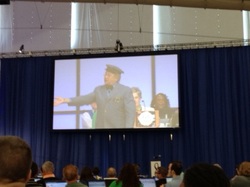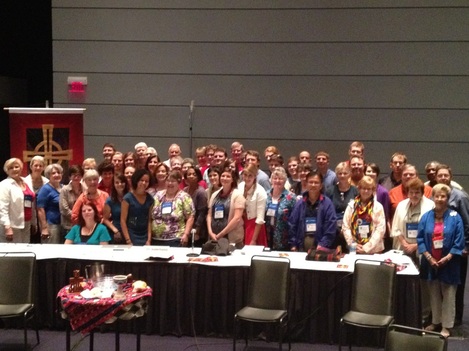 Do you recognize that photo? It's Mr. McFeely, from Mr. Rogers' Neighborhood. Fred Rogers was an ordained Presbyterian pastor whose special ministry was to serve children. He served faithfully through his PBS program for years, which was filmed in Pittsburgh, PA, the location of this year's General Assembly meeting. Mr. McFeeling made a 'special delivery' to drop in and wish us well at our meeting. Moments like those at GA are special. They remind us of the good things Presbyterians have done and are doing in the world as part of the larger body of Christ. Those moments helped sustain me during the difficult hours of working in committee. In this post, I want to share with you my experience on the Civil Unions and Marriage Issues Committee, and tell you some of the recommendations that other committees made to the full General Assembly (plenary session). Because the process is a little muddy, here's how things work: in the two years leading up to General Assembly, presbyteries may submit overtures (like a bill in Congress) to be voted on at the GA meeting. Presbyteries must receive a majority vote on their overture in order to send it to GA. This year, we received tons of overtures from presbyteries regarding changes in language in the Book of Order (our constitution), new issues of peace and justice they would like the PCUSA to support, and programs they hope the church will create. GA also receives some overtures from the church's denominational offices. Every overture is assigned to a different committee to be studied at GA. The committees are made up of commissioners elected to attend the meeting. About two and half days of the eight day GA are spent in committee. The committee has to make a recommendation to the whole body, called the plenary, about whether or not the overture should be approved, disapproved, referred for more study and/or amended in some way. The plenary hears the recommendation from the committee, allows time for debate and then makes the final vote on each overture. I served on Committee 13, which studied how we define marriage in the church. We had about 50 members on the committee. As my committee moderator said, "we were given an impossible task - to solve the issue of defining marriage for the church." Throughout most of those two days, it did feel impossible. I came really wanting to listen for the Spirit. But I also came hoping to hear something new in this debate. I have been aware of and immersed in the discussion surrounding issues of sexuality in our church for years, but was hoping that at this major event, we might discover a new path or come to some breakthrough that would lead us forward. For people who had little knowledge about the debate or really didn't know where they stood, I think there was some clarity. For others of us, it was a difficult discussion and one that we felt we had heard many times before. That made it hard to know how to move forward together. Overall, there were three choices about what we would recommend to the plenary. 1.Re-affirm the church's current understanding of marriage, between one man and one woman 2.Change the church's understanding of marriage to be between two people 3.Issue an Authoritative Interpretation (AI) that would allow pastors and churches in states where same-gender marriage is legal to perform same-gender weddings without fear of prosecution in the church disciplinary process. [An AI is a statement that tells the church how to interpret our constitution.] For two hours, we hard from people inside and outside the church in open hearings. Each one received one minute to speak about how they felt on the issue, how they are impacted by it, and how they sense God leading us. The variety of voices was wide: people who claimed to be recovering gays urging us not to change the definition, pastors who had been prosecuted by the church for marrying gay couples, young people on all sides of the issue who want the church to continue to be strong for their generation, and members who said their church will leave the denomination if we make a change. That last one, which was repeated over and over, unfortunately, felt a lot like a threat Later, we also heard from Overture Advocates - representatives from the presbyteries who had sent us the different overtures about why they were asking us to approve their recommendation. Eventually, our committee had discussions in small groups about how we were feeling and where the Spirit was leading us. On the second day, we moved into our official business and began to conduct our work by voting on what to do. Though committees rarely issue new overtures, that's one thing our committee decided to do. We agreed to recommend that the whole (congregations, presbyteries, etc.) engage in a study of marriage during the next year and half. Though this is a hopeful idea, it remains to be seen whether leaders will really take up the challenge to have such a wide-ranging and potentially contentious decision. We also voted not to re-affirm the current understanding of marriage, and also not to issue an AI. The vote on the AI, however, was very very close. Finally, we moved onto the overture changing the understanding of marriage to include two people of any gender. To everyone's surprise, that vote passed in committee by one or two votes! Together, those were the recommendations we took to the plenary session. Stay tuned to Part 3 for what happened there. For myself, I had gone in thinking that an AI was a bad idea, as it seems to take away the voice of presbyteries, since it is automatic and not voted on by the lower councils. However, I was persuaded that it actually was the right way to go. It would un-tie the hands of churches and pastors to serve the needs of their individual members with regard to weddings, and the pastoral care and worship issues involved. No one would be forced to marry any couple they did not want, just as is the case now. And, the AI would prevent costly disciplinary cases. When pastors are prosecuted in the church, congregations, presbyteries and the pastors themselves are force to spend up to a hundred thousand dollars on the case. This is money that would normally be spent for mission and other church service. Our committee was asked, "how many hungry children could $100,000 feed?" Other committees also did difficult work. There was a committee on Mid-Council Issues, tasked with acting on recommendations of a two-year study that urged us to re-organize the church's governance structures with regard to Presbyteries and Synods. The main overtures were to eliminate Synods completely, which is the third highest governing body, just below the General Assembly itself. Over the years, synods have dwindled in power and effectiveness. Doing away with them would be a new way forward, though we would need to appoint several regional bodies to participate in the disciplinary process. Second, they advised us to allow for more flexible ways to create presbyteries. Rather than always being a regional body, they wanted us to be able to organize new presbyteries around a common missional purpose (such as starting new churches, or serving an urban area, etc.) There were concerns about both of these recommendations, especially that the presbytery item would allow people just to organize around like-mindedness, furthering turning us into a factional church. Therefore, the committee recommended disapproval of both these items. Finally, the committee on Middle East Issues had another of the hot button issues. They were asked to decide whether the PCUSA would divest from (take it's money out of) companies whose business supports violence and oppression in the Occupied Territory (OT) in Palestine. A group called Mission Responsibility Through Investing (MRTI) has worked for more than 10 years to get companies who hold our money to work for peace, rather than violence, in the OT. However, three companies never agreed to cooperate and so they recommended we divest from Caterpillar, Motorola Solutions, and HP. Each of these companies makes and furnishes products that are used to destroy Palestinian homes, monitor the movements of Palestinians, and track Palestinians at checkpoints by the Israeli government, respectively. Our Palestinian Christian brothers and sisters have also asked that we divest from these companies. This issue got a lot of play in the media. Some Jewish groups said that if we divested, Presbyterians would no longer be seen as friends of Jews. This kind of thinking assumes that all Jews and all Presbyterians think alike and is not an accurate representation of what divestment means. We are still supporters of Jewish people and of Israel as a nation. We do not, however, support the way Israel has occupied the land given to Palestinians, prevented them from freedom of movement, taken away their homes, and their ability to farm their land. Divesting from these companies would simply show our disapproval of those actions. I was convinced that our church should follow the MRTI recommendations and take a stand for justice, even when it is hard to do. I also trusted the Jewish groups who supported divestment. The committee agreed with this logic and recommended by a large majority that we divest from those three companies. Remember - this is just what happened in committee. It's not exactly where things shook out with the whole plenary GA session. But it is important to remember that each committee had more time, more resources, and more preparation to study these issues than all the other commissioners, so their recommendations are certainly to be respected as well-formed and thorough.
1 Comment
Judi
7/31/2012 08:48:11 am
Nice summary Emma.
Reply
Leave a Reply. |
Archives
February 2022
Categories
All
|
First Presbyterian Church of Warren

 RSS Feed
RSS Feed
